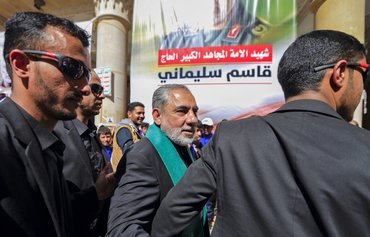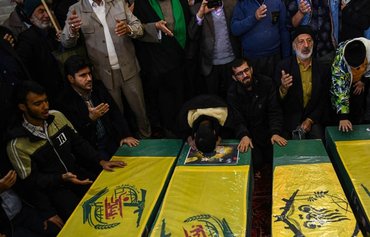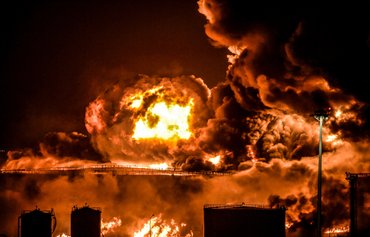ADEN -- Even a year after the death of Iranian Maj. Gen. Qassem Soleimani, Yemen is still paying a heavy price for his scheme of making the country a frontline state in Iran's regional proxy wars.
Soleimani, the former commander of Iran's Islamic Revolutionary Guard Corps Quds Force (IRGC-QF), had a huge hand in the current state of Yemen, which is on the brink of economic and political collapse.
The crisis in Yemen, fuelled by the Iran-backed Houthis (Ansarallah), has led to more than 17,500 civilians killed and injured since 2015, according to the Yemen Data Project. More than 20 million people are experiencing food insecurity and 10 million are at risk of famine, Human Rights Watch reported.
Soleimani was killed in Baghdad in a US strike on January 3, following repeated warnings against Iran and its proxies for launching attacks against the US and its allies.
![A combatant mans a heavy machine gun as forces loyal to Yemen's government clash with Houthi fighters in al-Jadaan, about 50 kilometres northwest of Marib in central Yemen on November 22, 2020. [AFP]](/cnmi_di/images/2020/12/27/27641-000_8vq24w-600_384.jpg)
A combatant mans a heavy machine gun as forces loyal to Yemen's government clash with Houthi fighters in al-Jadaan, about 50 kilometres northwest of Marib in central Yemen on November 22, 2020. [AFP]
![Slain Quds Force commander Qassem Soleimani is shown in an undated archival photo posted by the Iranian military on December 10. [Iranian Ministry of Defence]](/cnmi_di/images/2020/12/27/27639-qassem-soleimani-yemen-600_384.jpg)
Slain Quds Force commander Qassem Soleimani is shown in an undated archival photo posted by the Iranian military on December 10. [Iranian Ministry of Defence]
His death marked a pivotal moment in Tehran's decades-long campaign to sow militancy and discord in the Middle East and beyond.
Soleimani and the IRGC supported the Houthis financially, militarily and logistically, enabling them to implement Iran's agenda in Yemen, which has compounded the suffering of Yemenis by prolonging the war, now in its sixth year.
Upsetting regional balance of power
From the outset, the IRGC intended to use the Houthis as a proxy force to upset the balance of power in the region, due to the militia's strategic location near Saudi Arabia's southern border and the Bab el-Mandeb strait, a gateway for global trade.
"Soleimani wanted to transfer the IRGC's intelligence and security expertise to the Houthis, to carry out specific tasks that would gain them influence and control and disturb the security of the region and the world," said political analyst Waddah al-Jalil.
This would be achieved through qualitative operations, such as the launch of ballistic missiles and unmanned aerial vehicles (UAVs) and the laying of mines in international shipping lanes, he said.
Saudi Arabia has been targeted with dozens of ballistic missile and drone attacks since the start of last year, including a devastating and unprecedented strike on Aramco's facilities in the country's east on September 14, 2019.
The United States and Saudi Arabia held Iran responsible.
Earlier last month, a fire broke out at an offshore Saudi oil terminal after two explosives-laden boats launched by the Houthis were intercepted by Arab coalition troops.
Then on November 25, an explosion rocked a Greek-operated oil tanker docked at the southern Saudi port of Shuqaiq. London-based maritime intelligence firm Dryad Global said the explosion was caused by a "water-borne improvised explosive device" launched by the Houthis.
Just days earlier, the Houthis said they struck a plant operated by Aramco in Jeddah with a Quds-2 missile. Aramco said that strike tore a hole in an oil tank, triggering an explosion and fire.
Training with Hizbullah
"Qassem Soleimani was entrusted with the task of expanding the IRGC's influence in the region," said al-Jalil, emphasising the proxy wars Soleimani started in Iraq, Syria and Lebanon.
"Although Yemen is quite distant from these three countries... Soleimani used his relations and mobilised the militias affiliated with him in those countries to communicate with the Houthis and transfer experts and quality weapons to them," he said.
He also dispatched the Houthis' military and security commanders to Lebanon, Iraq and Iran to receive training and gain experience, he said.
In early 2015, a Hizbullah commander told the Financial Times that Houthi and Hizbullah fighters trained together for the previous 10 years. "They trained with us in Iran, then we trained them here [in Lebanon] and in Yemen," he said.
According to a May 2015 report by the Strategic Fikr Centre for Studies, the IRGC has been directly involved in training the Houthis' elite forces.
The training was conducted in two phases, the report said, with the first session, in 2011 and 2012, focused on high and middle-tier commanders. This training took place in Lebanon, Syria and Iran.
The second phase took place in the Houthis' camps in Saada, the report revealed, with cadres from Hizbullah and the IRGC taking part in the training.
Illegal smuggling operations
"The support and attention that Soleimani succeeded in giving the Houthis have devastated Yemen, and inflicted heavy damage on the countries of the region," said political analyst Faisal Ahmed.
"Soleimani, through his plans and smuggling units, delivered ballistic missiles... experts, weapons and material support," Ahmed said.
Most of the weapons the Houthis have been using in the war were not seen in Yemen before the militia's coup of September 2014.
Iran has used Yemen's 2,500-kilometre coastline, Yemeni islands and dhows to smuggle weapons to the militia.
Yemeni forces seized two arms-laden Iranian vessels -- the Jihan 1 and Jihan 2 -- in Yemeni territorial waters in 2013 and 2015.
This year, the Arab coalition seized two weapons shipments in April and June in the Arabian Sea en route to the Houthis.
The Yemeni Coast Guard intercepted in the summer several vessels laden with weapons, ammunition or cocaine in four different operations.
"[The death of] Soleimani left a void for the IRGC in implementing the plans that he had drawn for the Houthis," Ahmed said.
"This void is evidenced by the fact that Iran dispatched IRGC officer Hassan Eyrlou as its ambassador to directly supervise the Houthis and carry out military operations against Yemeni cities, international shipping lanes and Saudi economic facilities," Ahmed added.
These actions "prolonged the war and consequently devastated Yemen at all levels, creating the worst humanitarian crisis in the world", Ahmed said.
The road to regional security
"The IRGC's strategy was to reach Yemen in order to be close to the rich Gulf countries, and at the same time have a presence in densely populated areas to create a future army that would help realise its dream of seizing control of holy sites and oil sites," Abaad Centre for Strategic Studies director Abdul Salam Mohammed said.
The Houthi movement was "the necessary tool" for that strategy, he said.
Iran will continue to pursue its "hostile and destructive regional policies as long as the Khamenei regime is in power", he said, referring to Iran's Supreme Leader.
"New capitals will fall, and whenever it [Iran] controls a new place, it will never leave it. With this, it aims to create a security belt that will protect it after it announces its possession of nuclear weapons," Mohammed said.
The Iranian regime passed a law on December 2 ordering an immediate increase in uranium enrichment to levels closer to weapons-grade fuel and the expulsion of international nuclear inspectors if the international community does not lift sanctions on the regime by early February.
Such steps run counter to commitments made by the Iranian regime as part of a landmark nuclear agreement with world powers in 2015.
"Soleimani's role was to accelerate the implementation of Iran's strategy, which includes seizing Sanaa and Damascus as well as Beirut and Baghdad, and his killing will not change that strategy," Mohammed said.
"There are replacements for him in the IRGC, albeit not as powerful," he added.
The new Quds Force commander, Ismail Qaani, does not have the level of influence that Soleimani once boasted, but analysts said he was likely to steer a similar course.

![A Yemeni family sits outside a cave where they sought refuge due to poverty and lack of housing, west of Taez on December 2, 2020. [AHMAD AL-BASHA / AFP]](/cnmi_di/images/2020/12/27/27640-000_8wc9cu-600_384.jpg)






